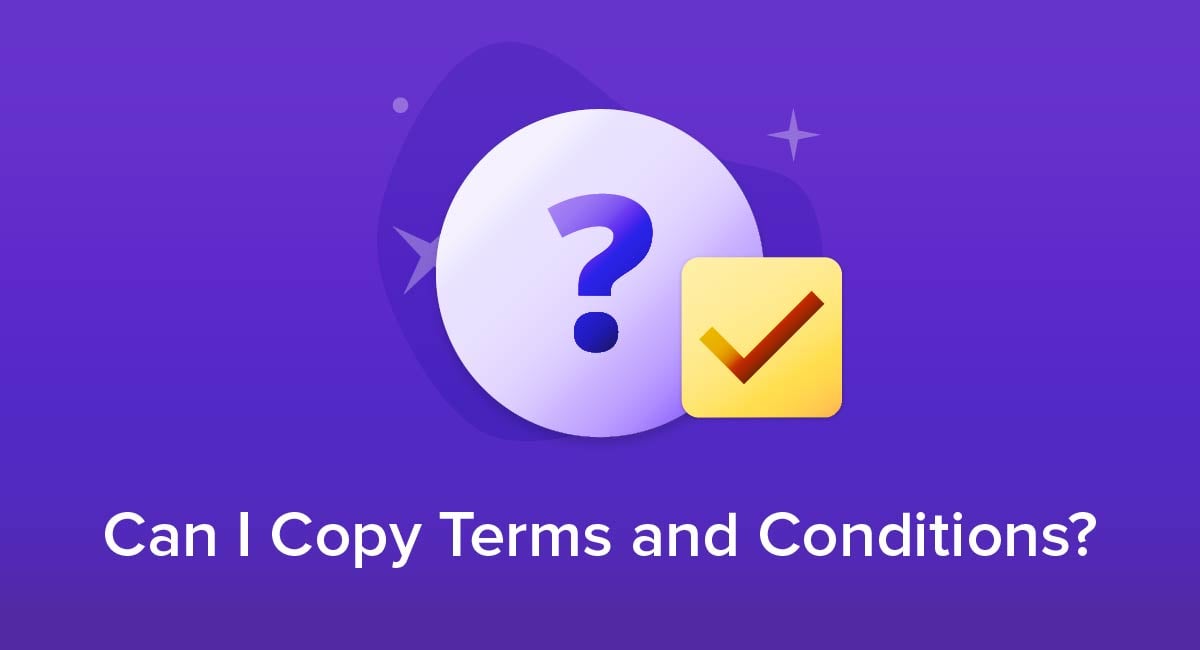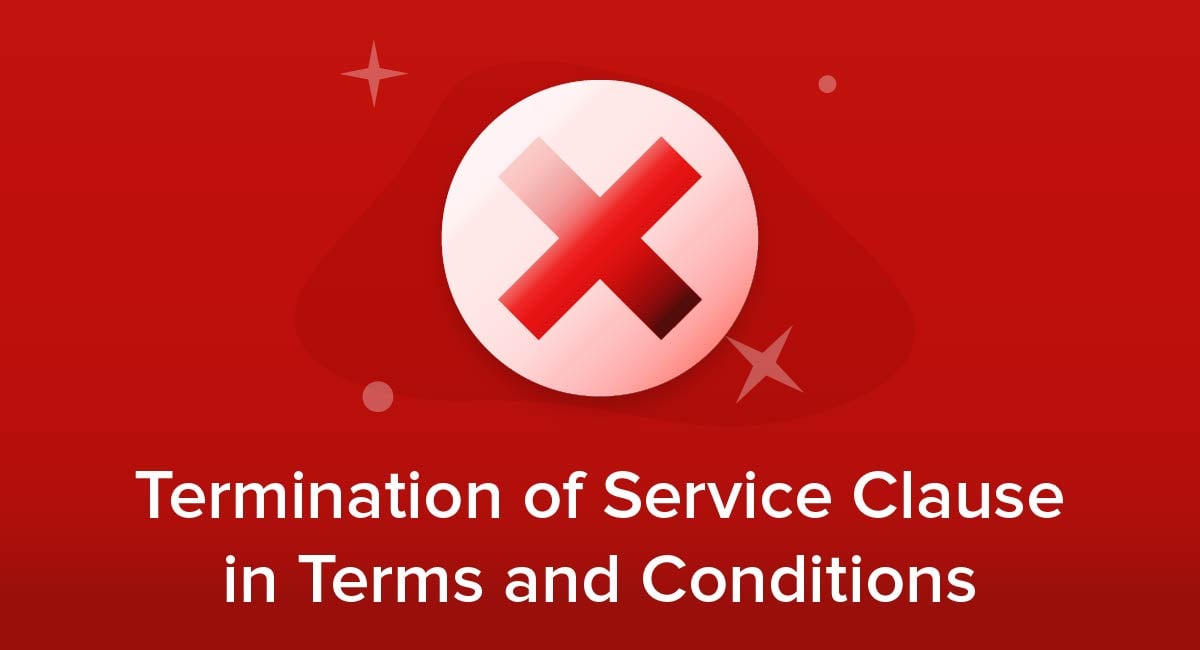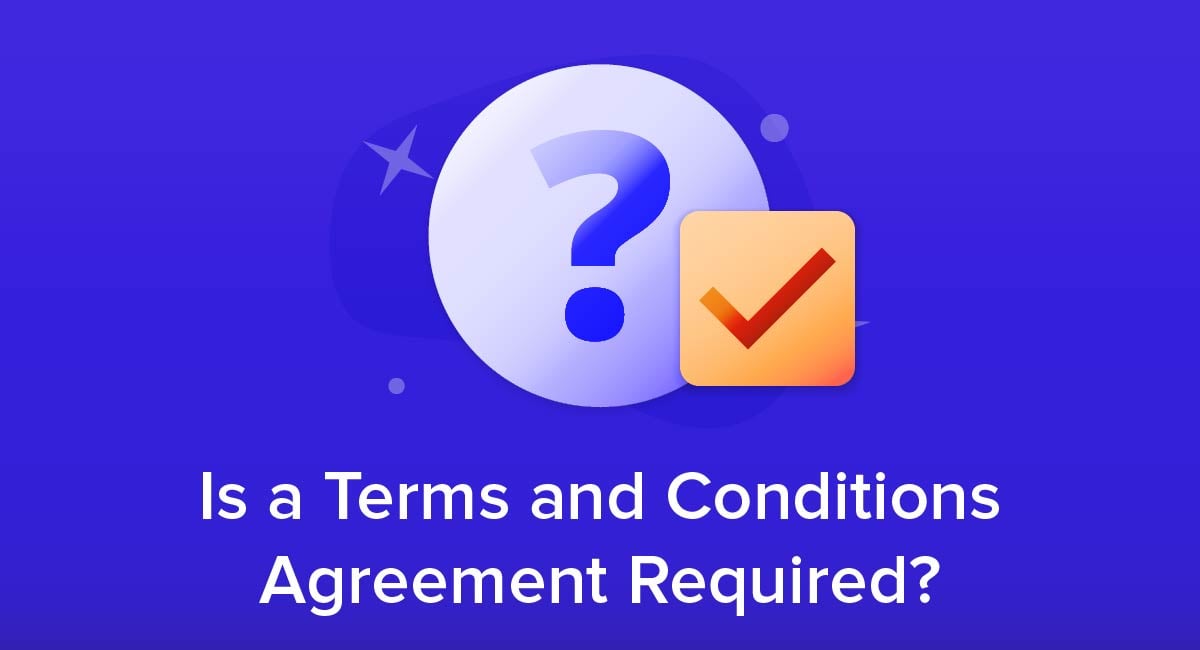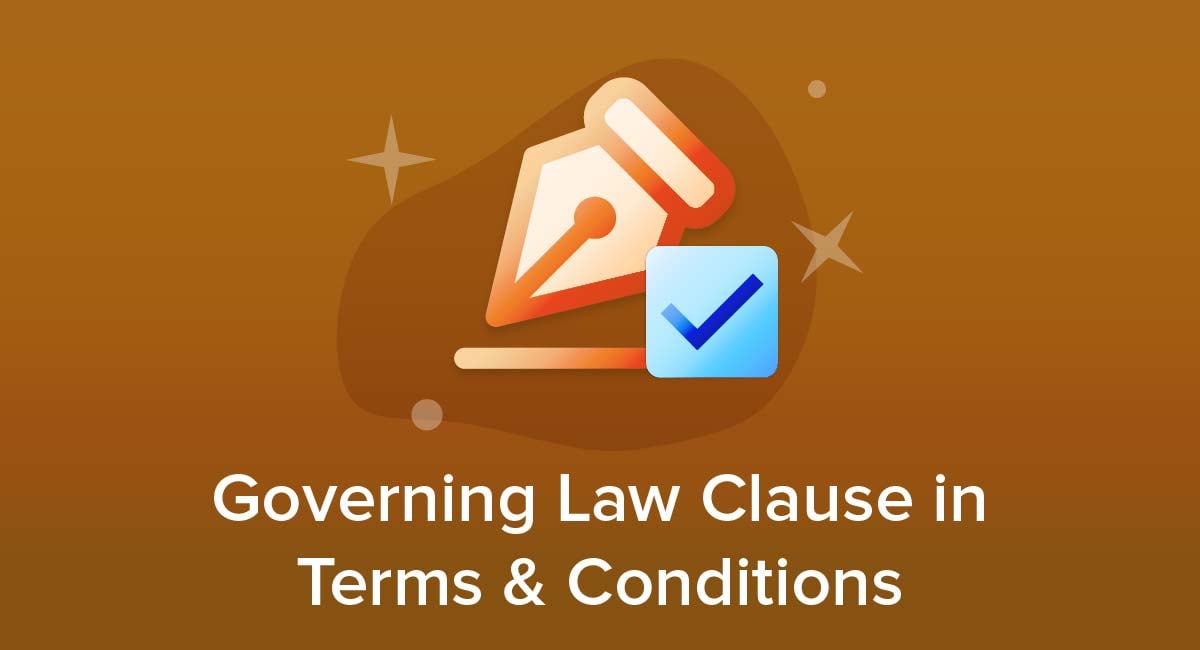
A governing law clause sets out which country or area's laws govern your Terms and Conditions agreement, as well as any legal issues that may arise between you and a customer or user. It's an important part of every Terms agreement.
Here's what you need to know about what a governing law clause is, why you need one, and how to draft your own.
Our Free Terms and Conditions Generator is created to help you generate a professionally drafted agreement that can include various terms and conditions for your site and/or app.
- Start the Free Terms and Conditions Generator from our website.
- Select platforms where your Terms and Conditions will be used (website, app or both):
- Answer a few questions about your website or app information:
- Select the country:
- Answer a few questions about your business practices:
-
Enter your email address where you'd like to receive the new Free Terms and Conditions and click "Generate":
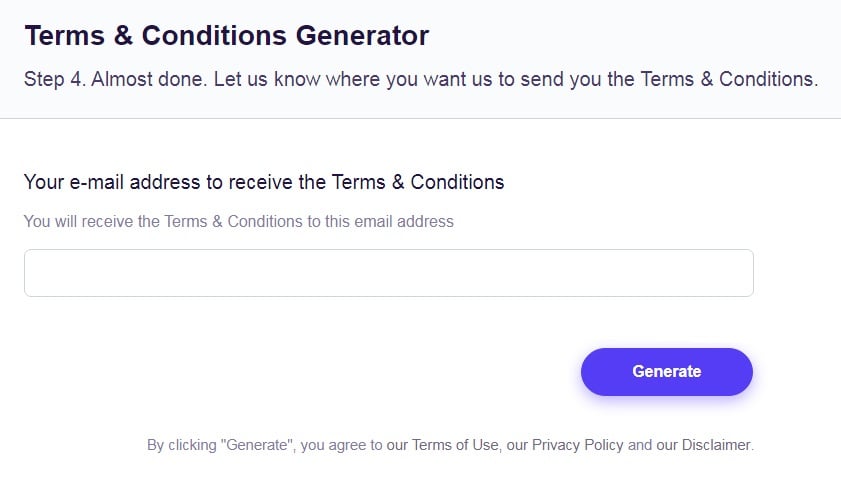
Once generated, you can copy and paste your Free Terms and Conditions agreement on your website or app or link to your hosted Free Terms and Conditions page.
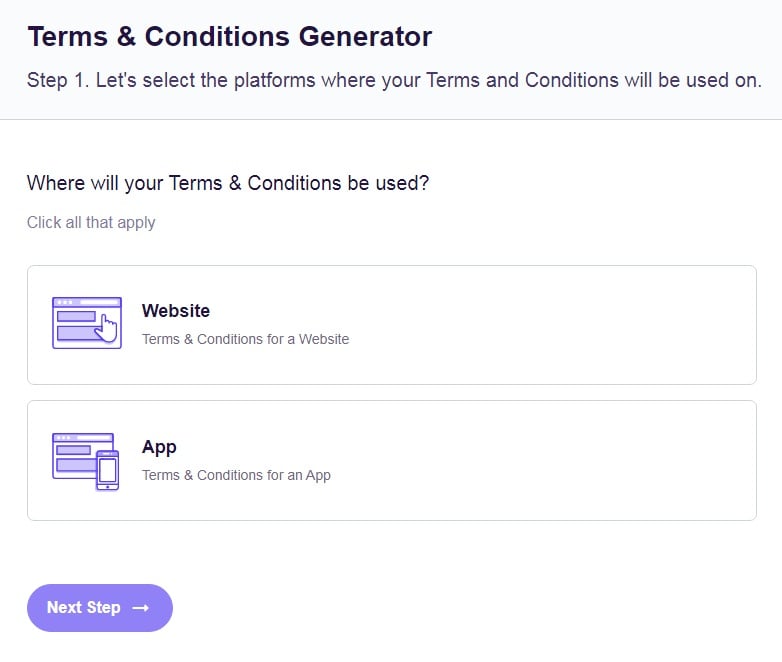
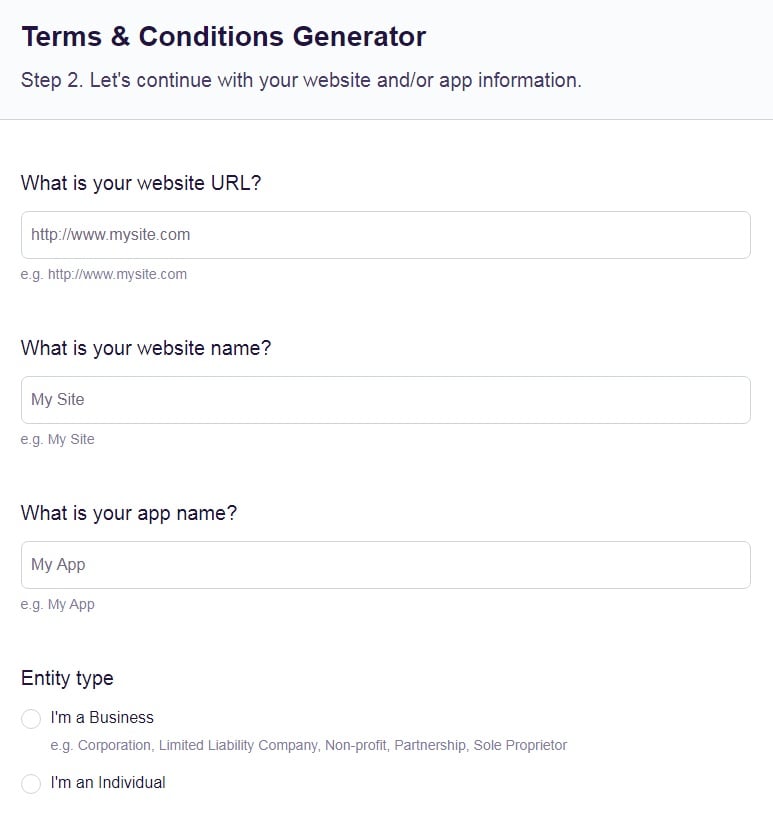
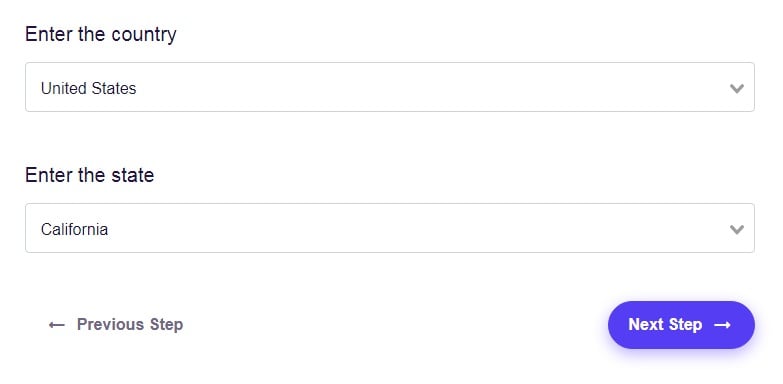
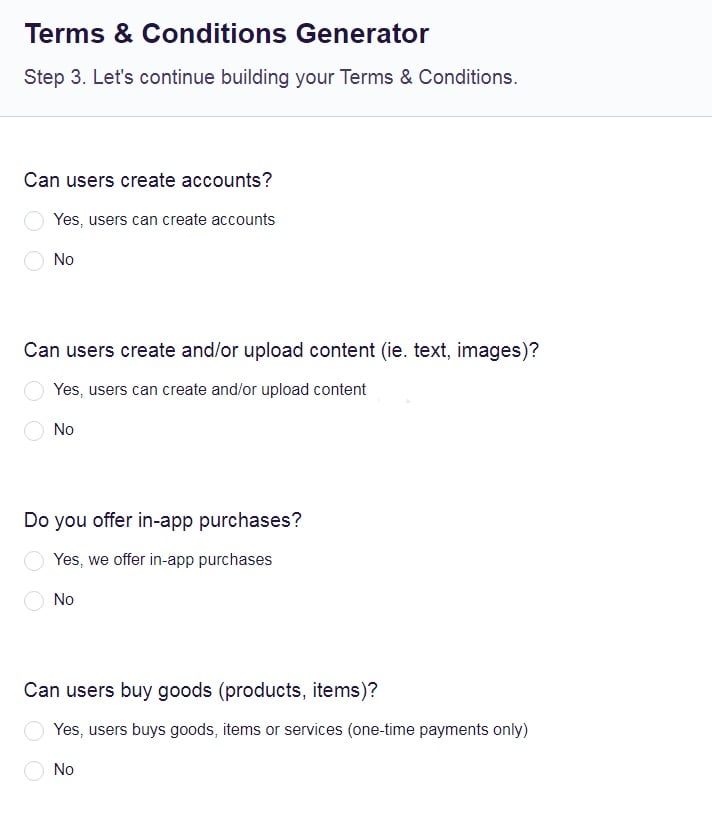
- 1. What is a Governing Law Clause in Terms and Conditions?
- 2. Why Have a Governing Law Clause in Terms and Conditions?
- 3. What to Include in a Governing Law Clause
- 3.1. What Set of Laws Apply
- 3.2. Venue (Also Called Jurisdiction)
- 3.3. Arbitration and Mediation
- 4. Formatting a Governing Law Clause in Terms and Conditions
- 5. Summary
What is a Governing Law Clause in Terms and Conditions?
As stated above, a governing law clause is a clause that lets your users know what laws your agreement will be interpreted and/or enforced under. This will usually be a specific region, country, or area, such as the laws of Texas.
Here's an example of a standard governing law clause you might commonly see:

Why Have a Governing Law Clause in Terms and Conditions?

While there's no legal requirement to include a governing law clause in Terms and Conditions agreements, doing so has several important benefits:
- It gives both sides certainty about which laws apply and in turn how the various points in the Terms and Conditions agreement may be interpreted or upheld by a court.
- It removes the financial costs and delays in resolving the question of what laws apply should either side pursue legal action.
- By writing the clause, you have the initial say in which laws apply. This then puts the burden on the customer to either agree with your choice, seek to negotiate a change in your Terms and Conditions agreement, or decide not to do business with you. In many, if not most, cases they will opt to agree with your choice.
A Terms and Conditions agreement forms a legal contract between you and another party, most commonly a customer. Usually, the agreement will set out rules that apply to all such relationships, regardless of the specific points of a deal such as a customer ordering a particular product at a particular price.
While a well-written Terms and Conditions agreement will reduce the need for legal debate or dispute, it's always possible that you and the other party will disagree about a point after your legal relationship has begun. It's also possible that one side may believe the other side has failed to live up to the agreement and wishes to enforce the contract.
This can be a problem if the two sides are in different locations with different laws. Without a governing law clause, any legal action could be delayed while the two sides argue about which set of laws should apply, where legal action can take place, and how it should proceed. A governing law clause addresses this issue in advance, meaning both sides know and agree on the key points of how any legal action will operate.
What to Include in a Governing Law Clause

A governing law clause will typically address some or even all of the following points.
What Set of Laws Apply
This part of the clause will set out which set of laws will apply to your legal relationship with the customer. Most commonly this will be the national laws of a particular country or region within one.
Most court systems will only hear a case where the governing law and venue has some connection to one or both parties. With a business this could be that you are legally registered, have a physical presence or do business in the relevant area. With the customer, this could be that they are a citizen or resident of the area or that they made the purchase there. Even if the case proceeds, enforcing any judgment may be difficult without a connection to one or both parties.
Note that the governing law clause only covers the direct contractual agreement between you and the customer. It doesn't override other legal obligations you may have that relate more broadly to your dealings with the customer.
For example, you may handle personal data when taking and fulfilling an order for a customer in a European Union country. This means your handling of that data comes under the General Data Protection Regulation (GDPR), which creates legal obligations for you and legal rights for the customer. These obligations and rights still apply even if your terms and conditions for the order have a clause saying U.S. law applies.
Dropbox notes that the terms are governed by California law unless required by law to be a different set of laws:

Venue (Also Called Jurisdiction)
This part of the clause sets out the court system where any legal action relating to the Terms and Conditions agreement must take place. How specific you can or should be in setting out the venue will depend on the jurisdiction. For example, in the United States, you might specify the courts in a particular state or even a specific county.
You need to weigh up several factors when choosing a venue and may need to take legal advice before doing so. One option is to choose a venue that is physically convenient for your business, or where your lawyers operate. Another option is to choose a venue that has a historic record of interpreting Terms and Conditions agreements in ways that are likely to benefit you in a dispute.
Additionally, the governing law should apply in the chosen venue. There's no point, for example, saying that the agreement is governed by the laws of Spain but that any legal action must take place in the New York state courts.
FullStory not only sets out a venue but imposes consequences for ignoring the clause:
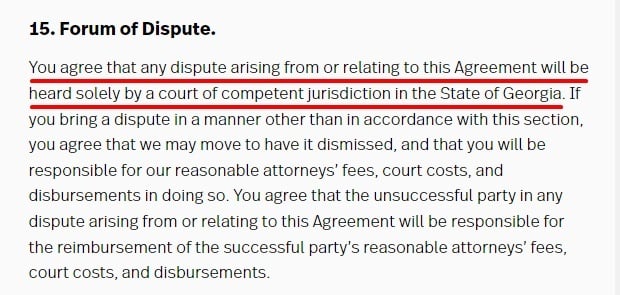
Nature includes jurisdiction information for customers in the United States, and those who are not:
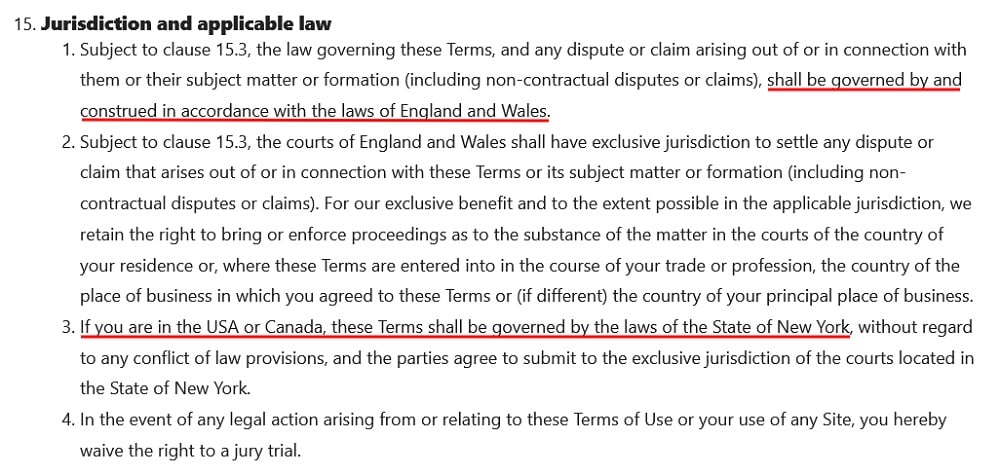
Wolters Kluwer also sets out multiple options for the venue:

Arbitration and Mediation
This part of the clause will set out whether the two parties need to go through alternative resolution processes before any court action can proceed. Key points to address include:
- Where arbitration or mediation will take place and who will make any decisions
- Who pays any costs
- Whether the outcome of the arbitration or mediation is binding, or whether either party can reject the outcome and proceed with court action
The World Bank requires binding arbitration:
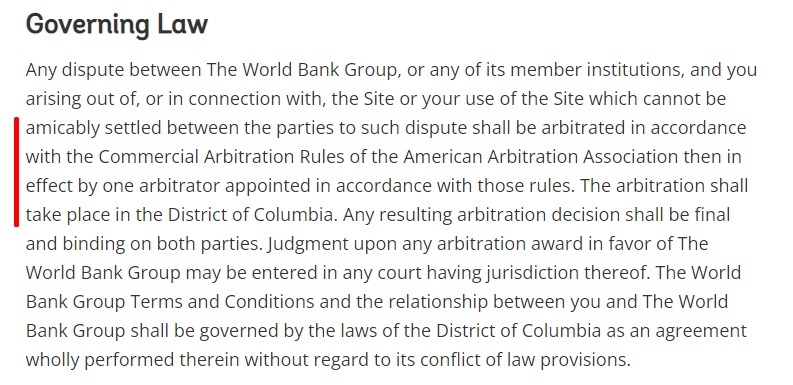
Danger Coffee notes that arbitration must take place in Seattle, Washington, USA:
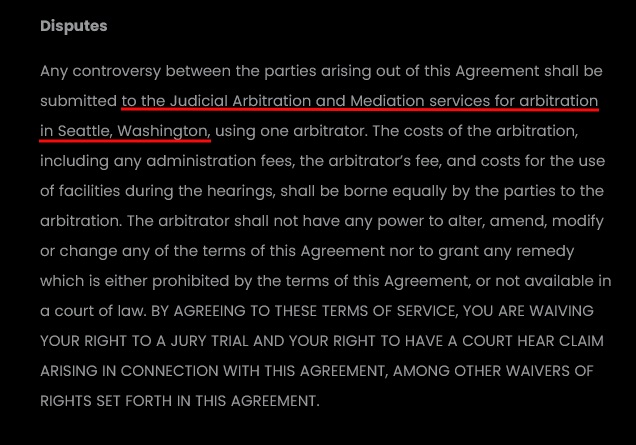
As you can see, there are a variety of ways to write these clauses, and a range of information to be included.
Formatting a Governing Law Clause in Terms and Conditions

To make sure a governing law clause is effective you need to be as confident as possible that both sides understand it and that it has no ambiguity. As well as using clear, specific language, you should make sure it is as detailed as necessary to cover all the relevant points but avoid any unnecessary detail. This reduces the risk that the clause is unwieldy and that key points are lost amid excessive text.
If you do want or need to emphasize either the entire governing law clause or specific parts of it, consider other options such as bold text, a larger type size or underlining. Do not, under any circumstances, deliberately put the clause in smaller or lighter text than the rest of the Terms and Conditions.
Spotify uses a clear chart to convey what could otherwise have been a confusing piece of text to cover multiple governing law and venue possibilities:
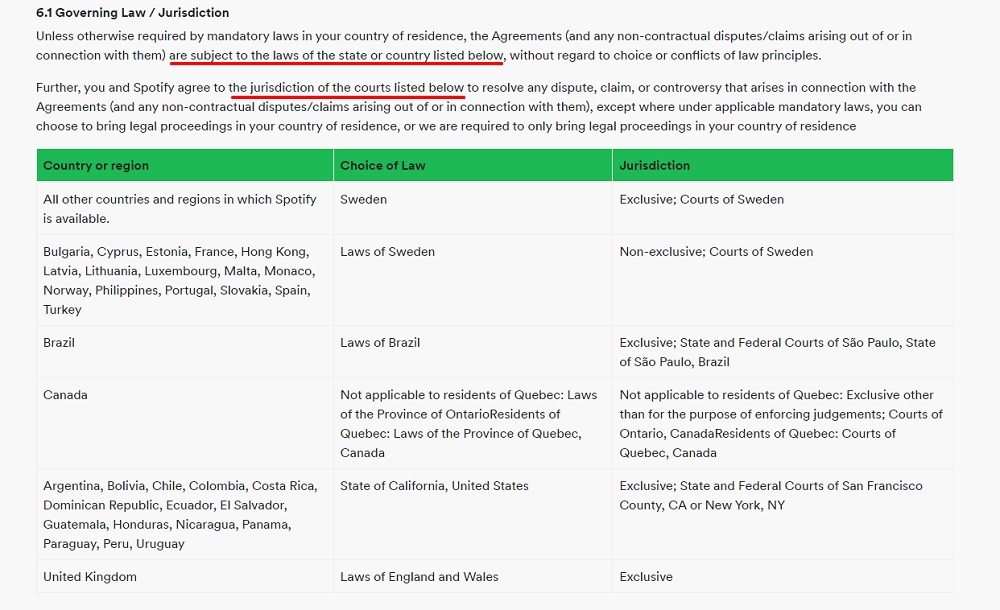
Summary
Let's recap what you need to know about a governing law clause in Terms and Conditions.
The governing law clause clarifies which laws cover the legal relationship between two parties such as you and a customer. Using a governing law clause offers more certainty about how any legal action will proceed.
A governing law clause can cover three main points:
- Which country or area's laws will apply to any legal dispute about your Terms and Conditions agreement
- Which court system any dispute will take place
- Whether you must go through arbitration or mediation before going to court and whether the outcome is binding
At least one party should have a connection to the country or area of the governing law and venue. Without this connection, getting a court heating or enforcing a judgment may be difficult or impossible.
The governing law should apply in the venue.
The clause only covers your relationship with the customer regarding the transaction. Laws from other countries or areas may still apply to your activity, for example with data handling and privacy.
Present your governing law clause as clearly and concisely as possible while covering the relevant points. If you want to emphasize all or part of the clause, consider methods such as bold text or larger type size. Lists and chart formats help as well.
